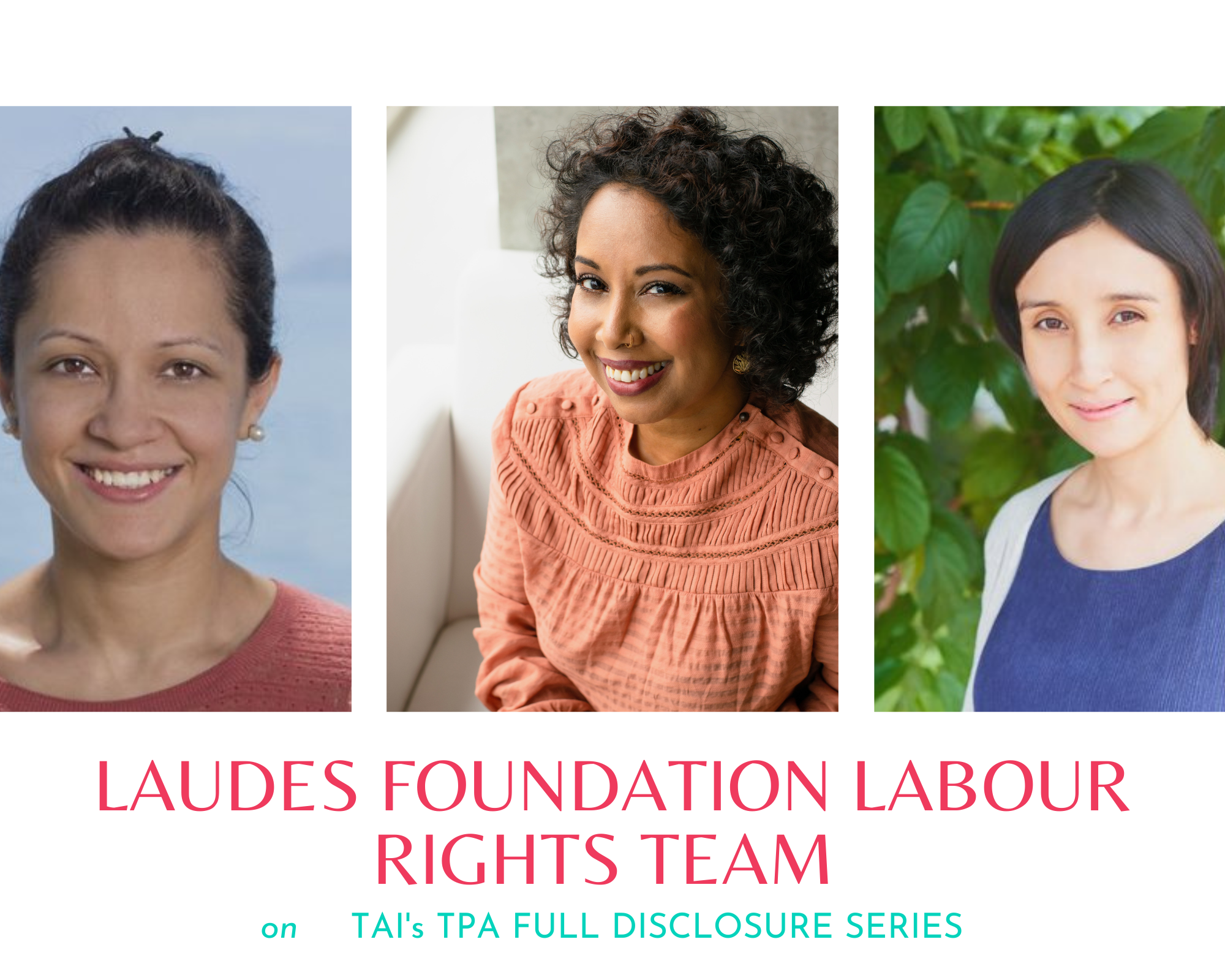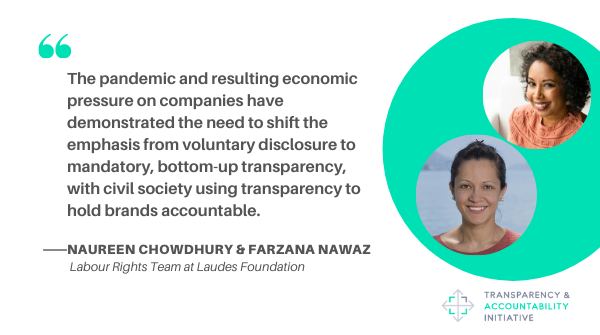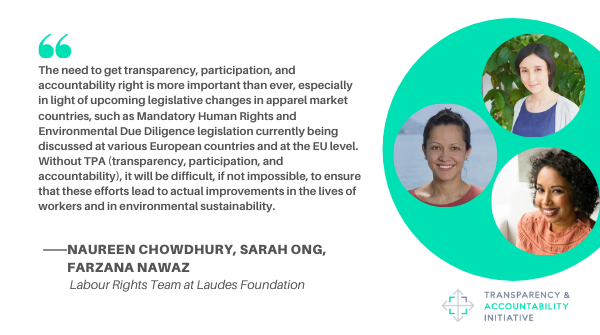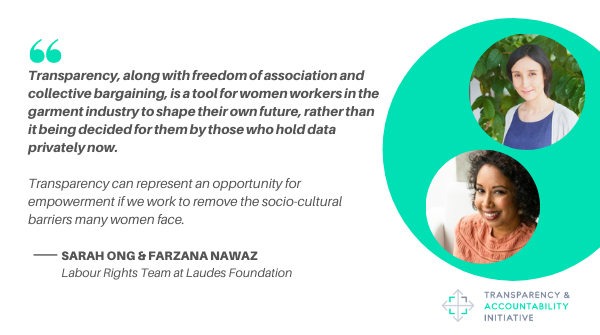
Laudes Foundation Labour Rights Team. From L to R: Naureen Chowdhury, Farzana Nawaz, and Sarah Ong
The garment trade has long been plagued by opacity on sourcing, supply chain conditions, and how benefits are shared. The need to get transparency, participation, and accountability right is clear, especially in light of upcoming legislative changes in apparel market countries. Last year, Laudes Foundation published a report on the transparency journey for the Bangladesh apparel sector, noting that while transparency features heavily in industry rhetoric, there remains considerable apprehension around using transparency to improve accountability. We spoke with the Labour Rights team at Laudes Foundation – Sarah Ong, Naureen Chowdhury, and Farzana Nawaz about ways to improve corporate accountability and how the pandemic has affected conditions.
Why is transparency, participation, and accountability (TPA) important to the work done by Laudes Foundation’s Labour Rights team?
Sarah Ong: Transparency – public disclosure of data that enables constituents to hold decision-makers to account – is critical to rebalancing power within the economic system. For example, in the fashion industry, one of Laudes Foundation’s three focus sectors, supply chains are notoriously complex and opaque, with power tilted towards fashion brands at the top of the supply chain. However, over the last five years, there has been a significant increase in the number of brands disclosing their sourcing factories, thanks to the advocacy of groups like the Transparency Pledge and Fashion Revolution. This disclosure incentivizes brands to be more thorough in their due diligence as the sourcing relationship is public. It enables factory improvements by empowering workers and organizations representing them to escalate factory issues to buyers if they can’t be resolved directly.
In order to enable more of this accountability, Laudes Foundation supports organizations working across four steps to change: 1. Advocating for transparency, 2. Collecting and disclosing data by third parties, 3. Making data useful, 4. Using transparency for accountability.
 How has the outbreak of COVID-19 affected the adoption of transparency initiatives in the apparel sector? Do you expect/foresee a pushback to further addition of TPA tools in the sector?
How has the outbreak of COVID-19 affected the adoption of transparency initiatives in the apparel sector? Do you expect/foresee a pushback to further addition of TPA tools in the sector?
Naureen Chowdhury and Farzana Nawaz: We are already seeing a slew of backsliding of labour laws/protections in the wake of COVID-19, for example, in apparel producing countries such as India and Indonesia. The 2021 Fashion Transparency Index points out that progress on transparency in the global fashion sector is still too slow – brands received an overall average score of only 23%, with 20 brands and retailers receiving a 0% scorecard. Cancellation of orders by brands and retailers during the pandemic placed immense financial burden on suppliers and workers – 75% of suppliers reported having to cut working hours due to buyer purchasing practices. However, only 18% of brands disclosed data about canceled orders last year. The pandemic and resulting economic pressure on companies have demonstrated the need to shift the emphasis from voluntary disclosure to mandatory, bottom-up transparency, with civil society using transparency to hold brands accountable.
Civil society actors have also led the way when it comes to innovating data collection methods during a global pandemic. In Indonesia, Gajimu adapted their data collection method from in-person to virtual in order to provide an assessment of the measures factories had taken (or not) to protect workers from the spread of COVID-19.
Apart from Bangladesh which has embraced greater transparency in the wake of the fire in Rana Plaza, has there been an uptake in other major garment-producing countries? In what ways can transparency, participation, and accountability take hold?
Sarah Ong, Farzana Nawaz, and Naureen Chowdhury: In recent years, we have seen an eco-system of complementary organizations and initiatives emerge, which work together to enable accountability through transparency. Initiatives like Gajimu and Mapped in Bangladesh are gathering much more granular data than has been available before, and publishing it in an inclusive way. For example, Gajimu gathers information about factory conditions directly from workers via their unions, which is then published (in Bahasa and English) and used as the basis for union-factory dialogue. Mapped in Bangladesh collects and publishes data on direct-export and sub-contracting factories. This is critical information for the industry to assess trends and ensure that factories not supplying to major brands are also accounted for.
But we have learned that just publishing data is never enough, it must be used. Organizations like Open Apparel Registry (OAR) and Wikirate are collating disparate data to make it more findable, accessible, interoperable, and reusable.
Better Work, a collaboration between ILO and IFC, publishes important data on factory-level working conditions in key apparel-producing countries such as Cambodia, Indonesia, Vietnam, and Jordan. However, the level and quality of data published on the transparency portal vary widely between countries. For example, while data on all apparel exporting factories are published on the Better Factories Cambodia portal, in the case of Vietnam, data on only a subset of export-oriented factories is available on the portal. The data published is also not suitable for use by workers and trade unions to negotiate for better working conditions, as the experience of civil society and trade unions in Cambodia, Indonesia, and Bangladesh show.

While there has been a lot of progress in the fashion sector, we still have a long way to go, particularly on the participation of those the data is about – we have to prioritize data democracy – the right of workers to have a say in how data is collected, validated, and accessed. And to design disclosure so that workers can use it. Too often data disclosure is designed only with brands and consumers in mind, reinforcing the power imbalance in the system rather than leveling it. The power of data is in the hands of the person using it – and that is why if we’re serious about improving working conditions we have to commit to overcoming the many barriers workers face in accessing and using information.
The need to get transparency, participation, and accountability right is more important than ever, especially in light of upcoming legislative changes in apparel market countries, such as Mandatory Human Rights and Environmental Due Diligence legislation currently being discussed at various European countries and at the EU level. Without TPA, it will be difficult, if not impossible, to ensure that these efforts lead to actual improvements in the lives of workers and in environmental sustainability.
What does genuine inclusion look like across the Ready Made Garment (RMG) value chain and how can stakeholders make this standard practice?
Farzana Nawaz: Freedom of Association must be assured if there is to be genuine inclusion in the RMG value chain. As a recent ITUC report points out, it is under attack in most apparel-producing countries, and this is a cause for grave concern. However, just ensuring Freedom of Association rights is not enough. For workers to be able to meaningfully participate in negotiations, either at their factories or at a sectoral or national level, they need to be able to engage in evidence-based bargaining. And this is where transparency and access to meaningful data play a crucial part.

How will transparency in the garment industry impact the future of work, especially as it impacts women?
Farzana Nawaz and Sarah Ong: Transparency, along with freedom of association and collective bargaining, is a tool for women workers in the garment industry to shape their own future, rather than it being decided for them by those who hold data privately now. However, women in developing countries, such as those employed in the garment sector, face serious challenges when it comes to accessing technology tools, which are often a precondition for utilizing data. While much more work remains to be done in terms of making good data easily available to workers, equal emphasis needs to be placed on equipping workers, especially women, with the capacity to access and utilize that data. Transparency can represent an opportunity for empowerment if we work to remove the socio-cultural barriers many women face.
What advice would you give your younger self starting out in this field?
Farzana Nawaz: My advice to my younger self would be patience. Meaningful improvements in transparency take time and for that to translate into real change in people’s lives take even longer. This work is not for short-term results but for enduring long-term change.
Sarah Ong: Stand on the shoulders of those who have gone before you. My grantmaking has benefited so much from the practical experience of Jill Tucker implementing the Better Factories Cambodia transparency portal, and the rigorous research on what makes transparency effective from people like Archon Fung, Mary Graham, and David Weil.
Naureen Chowdhury: My advice to my younger self would be don’t be afraid to ask the hard questions and be the one in the room seeking answers. There really are no shortcuts to distmantling the power imbalances and those closest to it on the ground have the solutions – listen to them as they know best.
Love to hear more from the Laudes Foundation Labour rights team? Connect with Laudes Foundation on Twitter at @Laudes_fdn


